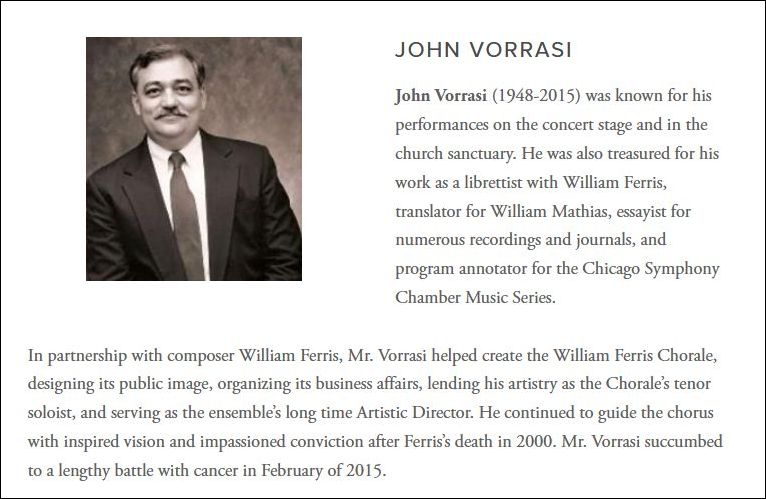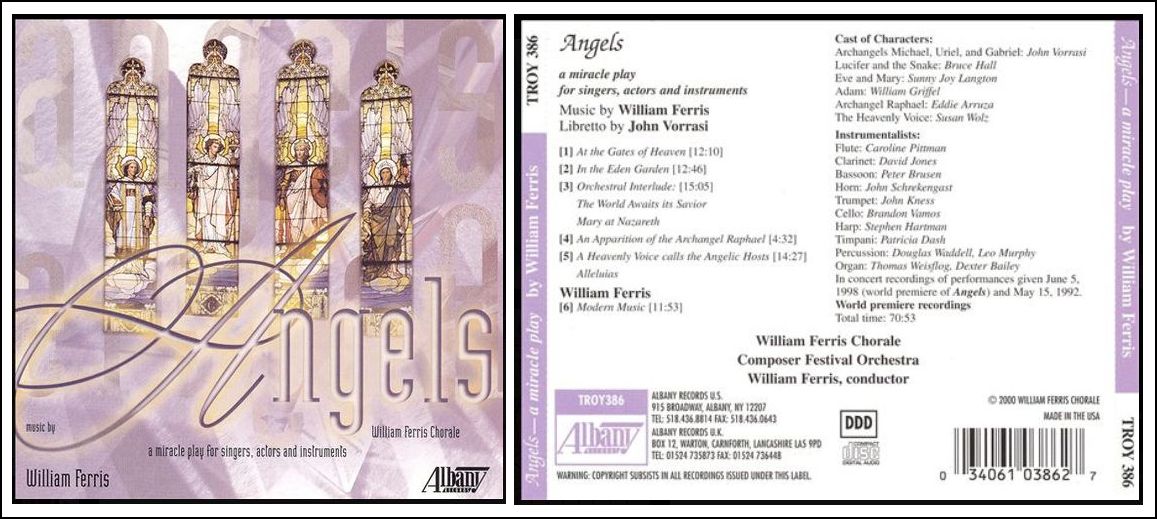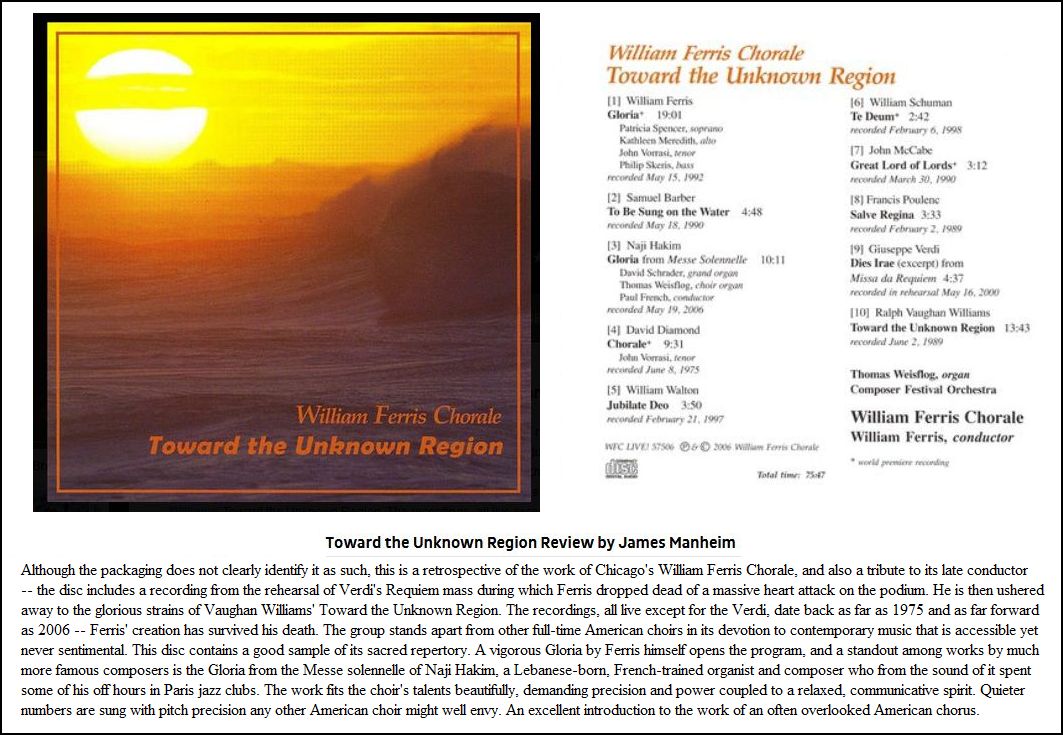Tenor / Administrator John Vorrasi
A Conversation with Bruce Duffie
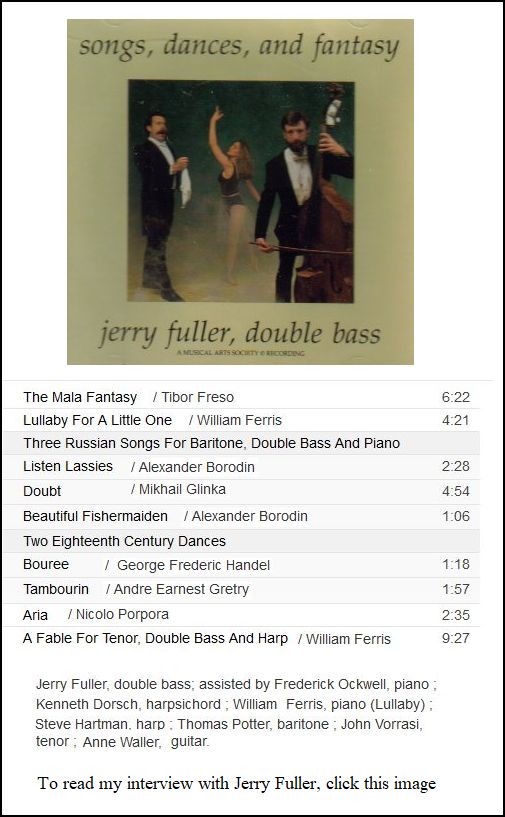
Having attended many concerts by the William Ferris Chorale, and promoted
them on WNIB, Classical 97, I had known John Vorrasi for many years. In
April of 1998 we decided to get together for an interview, and he graciously
came to the studios of the radio station.
While we were setting up to record our conversation, out chit-chat went
back to his early training in the Church . . . . .
Bruce Duffie: Do you have any regrets about
not being a priest?
John Vorrasi: [Smiles] Well... I
got some really wonderful training in the six years that I was in the
seminary, but my vocation really is in music, and that’s ultimately where
I was supposed to be. That’s where God led me, if you will, so all
is well.
BD: Let me change the question. Do you
feel that by singing and presenting music for God and everybody that you
are in some ways a priest?
Vorrasi: I believe music is really a wonderful
vocation. I sing in a lot of different places, and a lot of different
ways for a lot of different things. I was a cantor in a synagogue
for ten years, but primarily I’ve sung in Catholic churches, which, of course,
is my faith. I really believe that you move people terribly deeply
when you sing.
BD: No matter what you sing?
Vorrasi: Especially if your heart is in it.
Beauty is certainly a pathway to God, and therefore I fulfill my vocation
in a better way than I might have if I’d been ordained. It’s amazing.
Sometimes people put down other singers by saying, “Oh, well, he’s a church
singer,” but that’s insane. Every weekend I sing for about 1,500
or 1,800 people, and it would take you a long time to build up that kind
of audience if you do Schubert Lieder recitals. But I do feel
that when I sing I actually am praying, as Augustine said. So, it
ends up being my prayers which are always public. It’s not as private
as I’d like to be, but...
BD: Do you ever sing just for God?
Vorrasi: That’s a funny question. I really
do believe that music is a deeply spiritual and personal thing, and you
can’t help but be moved, and be in touch with the great spiritual core.
When I perform, I do feel that connection. It’s not always conscious,
and you can louse things up if you begin to think too much when you’re
performing. I’m basically an instinctual performer, and so when
I’m in touch with the essence of singing, then I guess that I am singing
for God.
BD: Is this some advice that you have for others
singers — to get everything
set, and get yourself set, and then make it instinctual?
Vorrasi: That’s really true. You have
to have a natural sense of feeling for singing. When I first began
to sing, I would just sing totally naturally. I was blessed with an
instrument that is a natural sound. Then I begin to study, and my
first experience in studying was that I began to think about everything that
I was doing, and I questioned everything I was doing. I would question
every breath, every support, every tone. It was terrible. I thought
that this was freaking nuts. So, I finally got to a point where
I just sang again, but, thank God, at that point I had learned technique
from some wonderful teachers, so that I was pretty certain what was going
to happen when I opened my mouth. I knew basically what was going
to come out, and it wasn’t going to be just a whim of chance. There’s
some science to it.
BD: I assume that most of that helps to make
the career longer?
Vorrasi: True. Giuseppe di Stefano had
a fantastic voice, but unfortunately he had next to no technique. He
would spill that beauty out all the time, but eventually it burned itself
out because, without the structure of the vocal technique, it’s just going
to be murder on the cords. Actually, one of my great teachers, Eileen
Deneen, is in her 80s, and she’s singing very well. She’s magnificent.
[To read a profile of Deneen, click HERE.] I also
sang with a wonderful old tenor named August Drozda. In his late 70s
and early 80s he was still singing better than some 25-year-olds. Obviously,
the voice had lost its bloom, but that guy had technique, and he knew what
he was doing. He was a sweet man who sang from his heart.
BD: Do you do any vocal teaching?
Vorrasi: I’ve been asked a gazillion times
to teach voice. Even Eleanor Steber sends
students to me who were coming here from New York, but I really don’t
have the time. I do so many things besides singing that sometimes
singing ends up being an afterthought because of all the other things
that I end up doing in my life. I manage the Ferris Chorale, and
for a whole chunk of years I wrote program notes for the Chicago Symphony’s
chamber series, and liner notes for recordings. Managing the Ferris
Chorale is a full-time job, in addition to my duties of singing with the group,
and with the church of Our Lady of Mount Carmel Parish, where I’m the staff.
BD: It’s really all wrapped up into one, though.
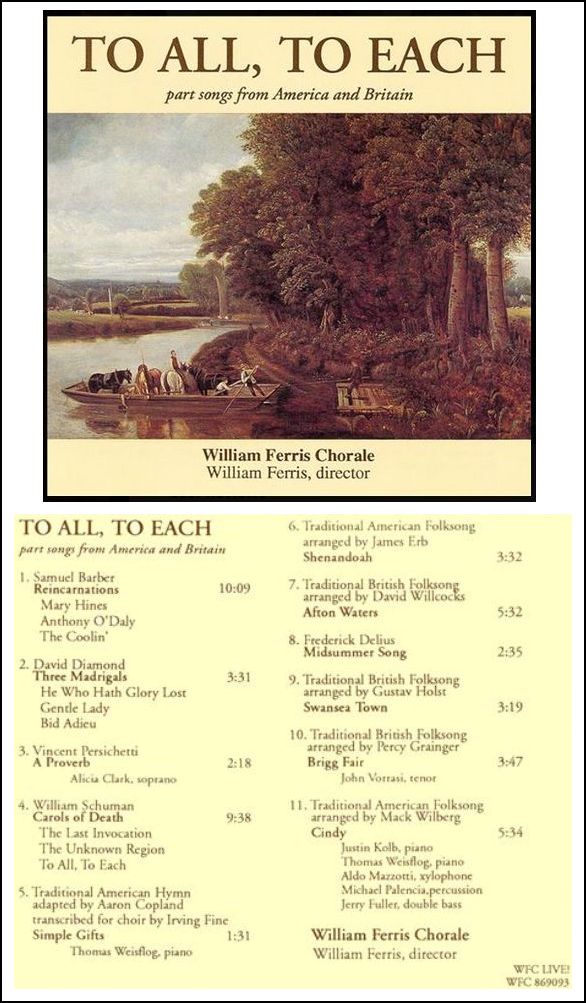
Vorrasi: It is. It is wrapped up into
one, and it’s a very interesting wrap. I wouldn’t change or trade
the way I’ve lived my musical life with anybody. I’m really quite
content. I’ve had the opportunity to work with some of the greatest
composers in the 20th century, including William Schuman, Vincent Persichetti,
Ned Rorem, Dominick Argento, Lee Hoiby, and of course
William Ferris.
I’ve been involved with really some great artists, such as Steber and
Sir Peter Pears, both of whom coached me. I can’t even begin to
say how wonderful those experiences were. When I sang the role of
Nicolas in Britten’s Saint Nicolas, Pears
coached me. It was the piece that opened up the first Aldeburgh
Festival, and Pears was in town for our anniversary concert of Benjamin
Britten’s music. I remember being in St. James Cathedral, an empty
church except for Peter sitting in the congregation, and Robert Morrison
at the piano playing the orchestra part. I came in, and Peter said,
“Could you just try it like this,” and he sang a phrase. Here was
Peter Pears, in his 70s, singing a phrase back to me. I
just wanted to die. It was so fantastic, it was surreal, it was so
wonderful. It was a glorious experience to be able to work with these
people, and to make music for them. [Vis-à-vis the recording
shown at right, in addition to works by Persichetti and Schuman, see my interview
with David Diamond.]
BD: It seems like a great inspiration to you.
Vorrasi: Oh, absolutely. I’m mad about
composers. I truly love contemporary music.
BD: Do you like all contemporary music, or just
those pieces which are well-written for the voice?
Vorrasi: [Laughs] I think that all music
imitates singing. Every instrument should imitate singing.
Without melody, what is the point of music? Just harmony and rhythm?
It’s the melody that sticks in your head, and melody is what drives
it. Melody is the great force.
BD: It started with melismas.
Vorrasi: That’s right, and those lovely chants
from the East or West, whichever way you want to look at it.
BD: Is it true that music is music is music,
and is the universal language?
Vorrasi: Certainly, if a Westerner would listen
to Chinese opera, I don’t think it would be as instantly accessible as
listening to something more in tune with our own cultural awareness.
BD: But that’s just familiarity.
Vorrasi: Right, that’s true. If the intent
of the gift or the spirit is really there, it communicates even though
it’s strange. We joke about music that’s easy to sing, but a lot
of music I perform is not easy to sing. It’s quite demanding, with
quite a lot of leaps, and odd intervals, and this and that. But it’s
music, it’s truly music. It’s got melody. It may not be as
simple as a Schubert song, but there is melody there, and that’s the driving
line, that’s the force.
BD: Do you get enough opportunity to sing Schubert’s
songs?
Vorrasi: I used to sing those things a lot. I
used to sing Schöne Müllerin, and Dichterliebe,
and all those things, but I don’t have the time to indulge in that. When
I sing solos in church, sometimes I do pull up earlier music including
Bach. When I first came to Chicago, I worked with Gavin Williamson,
who’s a wonderful coach. He used to make me sing a lot of very lyrical
opera arias, and some excruciatingly difficult, but beautifully lyrical Bach
arias. So, I do have those in my repertoire that I pull out every now
and then, but I have got to eat my Wheaties first. [Both laugh]
BD: You’re from where?
Vorrasi: I was born in Rochester, New York,
upstate New York.
BD: Why and how did you wind up in Chicago?
Vorrasi: [Modestly] I don’t know. It’s
God’s will, shall we say.
BD: It’s fortuitous
for us.
Vorrasi: It was fortuitous for me, too.
I came here because I was going to continue my studies in graduate school.
Eventually that fizzled away, and I began doing different things.
I decided that working with other artists, rather than going into
another academic thing, was what I needed to do.
BD: No regrets?
Vorrasi: Oh, none at all. Chicago is my
second home. My accent is certainly upstate New York, but Chicago
is really my hometown now.
* * *
* *
BD: Do you change your style at all if you’re
singing in a concert hall or at a church venue?
Vorrasi: Oh, yes. You have to be sensitive
to what you’re doing, and to the purpose of what’s going on. Even
in a concert hall, you change your style if you’re doing an intimate song,
or you’re doing something wildly dramatic. Generally speaking, in
church services you need to know where you are in the service, so you know
whether you can do something that’s particularly showy or you need to be
more reserved. But ultimately whatever you do, it has to serve the
purpose at hand, which is the liturgy.
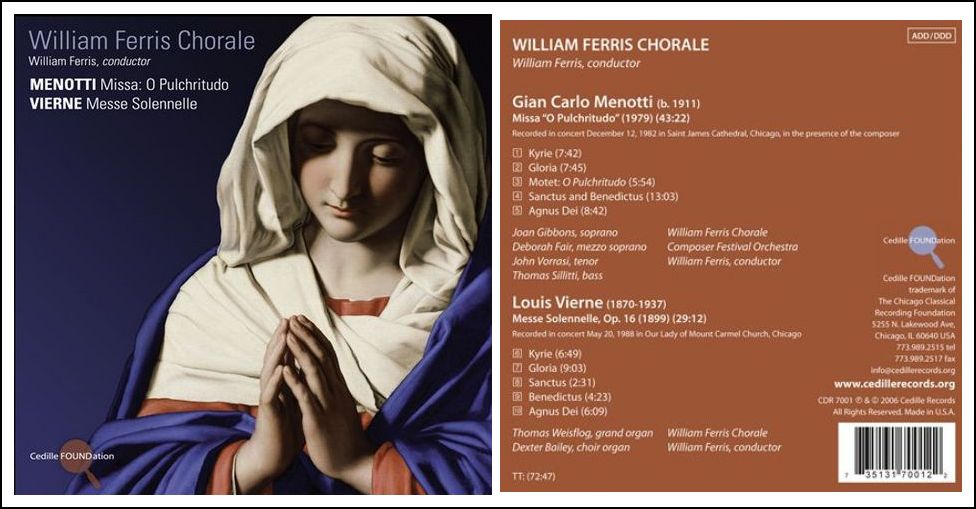
BD: Are you sometimes crippled a little bit
in not being able to sing music you want because of the acoustic environment?
If it’s a big booming acoustic in a church, you can’t do some more
technical things that would show off details.
Vorrasi: That’s true, but a lot of the Baroque
music was written for big bath-tubby churches, where all that sound is
knocking around in there. But I like to play with the acoustic.
For example, at Our Lady of Mt. Carmel, on Holy Thursday at the end of
the service of the Institution of the Eucharist, there’s a stripping of
the altars where they take away all the adornment because the next day is
Good Friday. During the stripping of the altars, Father Healy has
asked that I would sing, unaccompanied, Were you there when they crucified
my Lord?, which I do. Every year I try to sing it a little bit
differently. I have different ornamentations, and move things around,
but I learned that it’s really wonderful to be able to play with the acoustic
that’s there, to sing in a certain way so that the sound resounds in a
certain way. One does use the room. When Peter Pears was here,
I was taking him to the airport after ten days that he was here with us.
We were in the airport, and there was one of those famous Chicago
snowstorms that came up out of nowhere, so the airport was practically closed
down. We had to wait four and a half hours before his plane left.
So we sat in this very crowded waiting room, and we talked about singing,
and about how one makes the sound one makes. We began talking about
a certain vocalise, and he began to sing vocalises to me, and I sang vocalises
to him. I’m sure the people thought we were totally nuts, but we did
discuss it, and we both agreed that one can use the overtones that are
created when you sing, and the tones in the room that pick them up to amplify
and press them on. Peter’s voice was not enormous, and yet Britten
wrote these huge operatic parts for him, and he was always able to cut through
the orchestra. He was always on top. That’s why I have to laugh
sometimes, when you see a role that Peter created sung by a heldentenor,
which is the farthest thing from what was in the composer’s mind. But
that shows there’s other ways to do those roles...
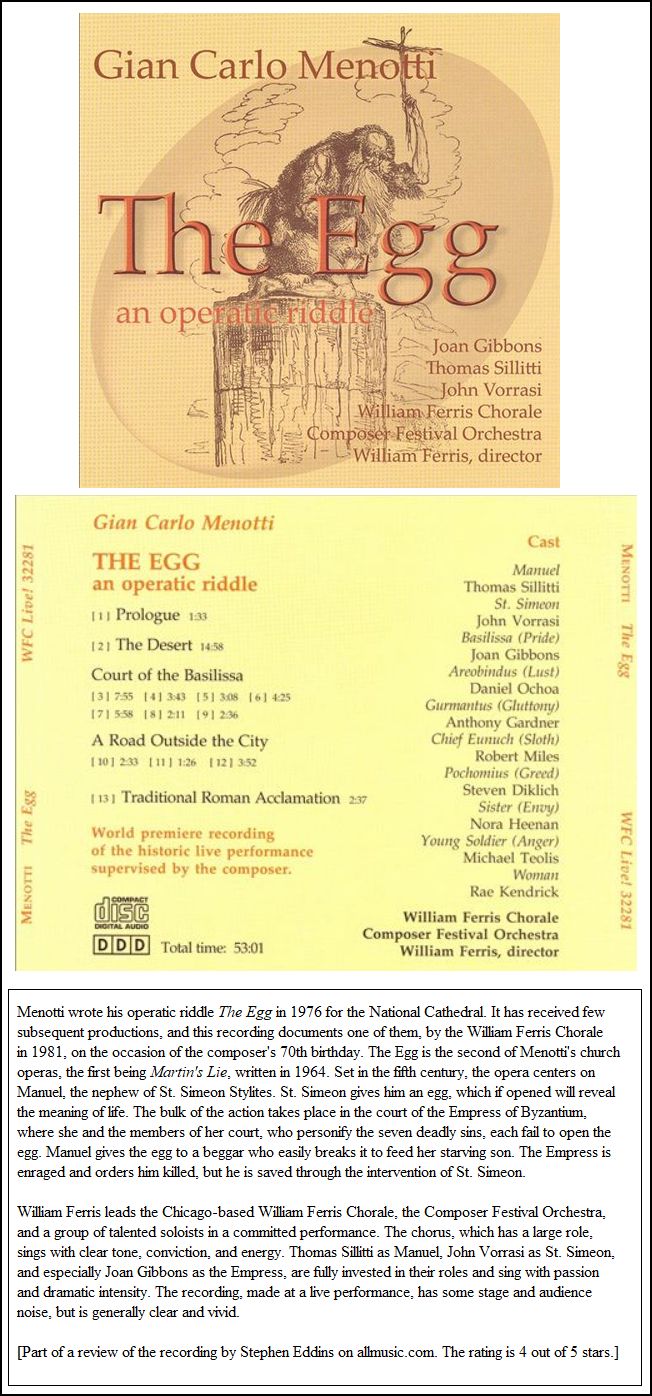
BD: ...and it still works.
Vorrasi: Right. The music is just wonderful.
BD: Was the airport crowd really pleased with
what you did?
Vorrasi: [Laughs] Well, I think that they
thought we were crazy, but I’ll never forget it.
BD: Have you thought about performing in different
places in the church, perhaps from the back or from the side?
Vorrasi: Normally when I’m working in the church,
I sing in the front because I’m leading the congregation. I do sing
from the back sometimes, in the choir loft, because the music was meant
to be coming from there. These churches are built like that.
BD: [At this point, the dogs which were kept
at WNIB started barking, and could be heard as we continued our interview]
Is music for the animals too?
Vorrasi: Yes, of course. There’s a wonderful
dog at Mount Carmel named Annie, and she does love music.
BD: Being so much of a church singer, you don’t
get as much choice of repertoire as if you were just doing concert works.
Is this a good thing or a bad thing, or do you like doing this repertoire?
Vorrasi: I do tend to pick my repertoire that
I sing in church, at least the solo things I do. And certainly, when
I’m working with William Ferris, we’re doing things that are interesting.
But even though I’m singing in church fifty weeks a year, I’m singing with
the Chorale almost as much, so I don’t think it’s limiting, even though
I’m not doing concert music in church... although, I did a role in a
Menotti opera, the
Chicago premiere of The Egg, which one could consider a parable,
or a religious opera if you will. That was an interesting thing. I
played St. Simeon Stylites. They had to build a huge column for me to
sit upon, and I had a long, long beard, and long, long hair. I was
supposed to be there forever in the desert, waiting for passersby to offer
me a glass of water.
BD: When William Ferris writes something specifically
for you, is it special to create this part or this role or this song?
Vorrasi: Yes. It’s really a marvelous thing,
because he writes for my voice. So, in a sense I become the instrument
that he’s working for, and the sound he’s working for. I’ve done
some very beautiful things of his. He set the poetry of Salvatore
Quasimodo, the Nobel Prize winning Italian poet, called, Ed È
Subito Sera, that he wrote for tenor and string orchestra. I
did that with the Chicago String Ensemble led by Alan Heatherington. [CD
of that work is shown below-right.] It was quite a wonderful
experience to do that, but it’s true that when things are written for me,
there’s an ease and the grace to them. Although, he knows my abilities,
sometimes he makes things more difficult than he would for someone else.
BD: It’s written for you. Does that preclude
it from any other tenor?
Vorrasi: Oh no, it’s
just different. It sounds different, that’s all.
BD: Have you heard some of ‘your’
pieces sung by other tenors?
Vorrasi: Actually, I haven’t, sorry to say,
but some of the pieces that I sing I’ve heard other singers sing, of course.
BD: Do you get ideas from those performances?
Vorrasi: I wouldn’t have done it that way. People’s
different voices can bring out different things.
BD: Then let me ask this. Is there such
a thing as a perfect performance?
Vorrasi: We’re really spoiled by the perfection
that comes from the recording studio. What makes the performance
perfect to me is if the music speaks directly to the people with no impediments.
If you have horns that are constantly cracking, or a voice that’s
constantly cracking or singing out of tune or wobbling or not pronouncing
the words, this is not making the channel direct. A perfect performance
is merely if the essence of the music can reach the people. Everything
doesn’t have to be technically perfect, but the spirit has to be right.
I don’t mean to excuse bad performances by saying they were heartfelt. They
have to be technically up there, too. Sharp or flat,
they’re both out of tune. One is not better than the other.
BD: I assume, though, that you’re always
striving for that perfect performance?
Vorrasi: You want to communicate things in the
best possible way, so naturally you want it to be technically perfect.
But, again, you know, the first time I heard Dichterliebe,
Ernst Haefliger
was singing it. He was way beyond his prime, but I was never so
moved by anything in my life to that point, because I had never experienced
the work, and he was a great artist. It was just unbelievable, and is
still indelibly burned into my memory. I know it wasn’t perfect, but
it was so musical, and that really is the bottom line for me. It has
to be musical.
BD: Who is it that puts the music into the music
— is it the composer who sets the scores,
is it the performer who performs the works, or is it the listener who hears
it in a certain way?
Vorrasi: I suppose all of those come together
at one point. The composer, obviously, puts the music into the
score. If the performer doesn’t make the music, then there’s no
music. The notes are really a road map to performance, and you
have to understand what’s going on in the music. Otherwise you’re
not going to get the essence of it, and you’re not going to be able to
communicate it. It needs to be something well-communicated. The
audience certainly has to feel it, otherwise they’re stones. I really
feel that if a person is the least bit open, and a really musical thing
is being performed, they’ve got to be moved by it. I believe that.
BD: To a greater or lesser degree?
Vorrasi: Yes. I’ve seen it happen. People
who wouldn’t have a clue what was going on can be extremely moved by
a heartfelt and really musical performance.
* * *
* *
BD: You do both solo singing and Chorale singing.
Is there a difference for you?
Vorrasi: Certainly. Singing is singing,
but there are certain styles or certain manners of performance. When
I’m singing in the chorus, and then I suddenly have a five- or six- or
seven-measure solo, there’s a difference in the way I’m producing sound coming
out. When I’m in ensemble, I’m blending into the ensemble. Even
when opera people on the stage do their quartets or quintets, if they’re
really with it, they’ll listen to the other singers, and they’ll blend
and make a fabulous sound. Therefore, the music comes out, and it’s
really being more musical, instead of some kind of a shouting match.
But that’s really the only difference. It’s
just the intensity, or the way one personalizes the sound when singing
solo, as opposed to the benign dictatorship of the Chorale ensemble.
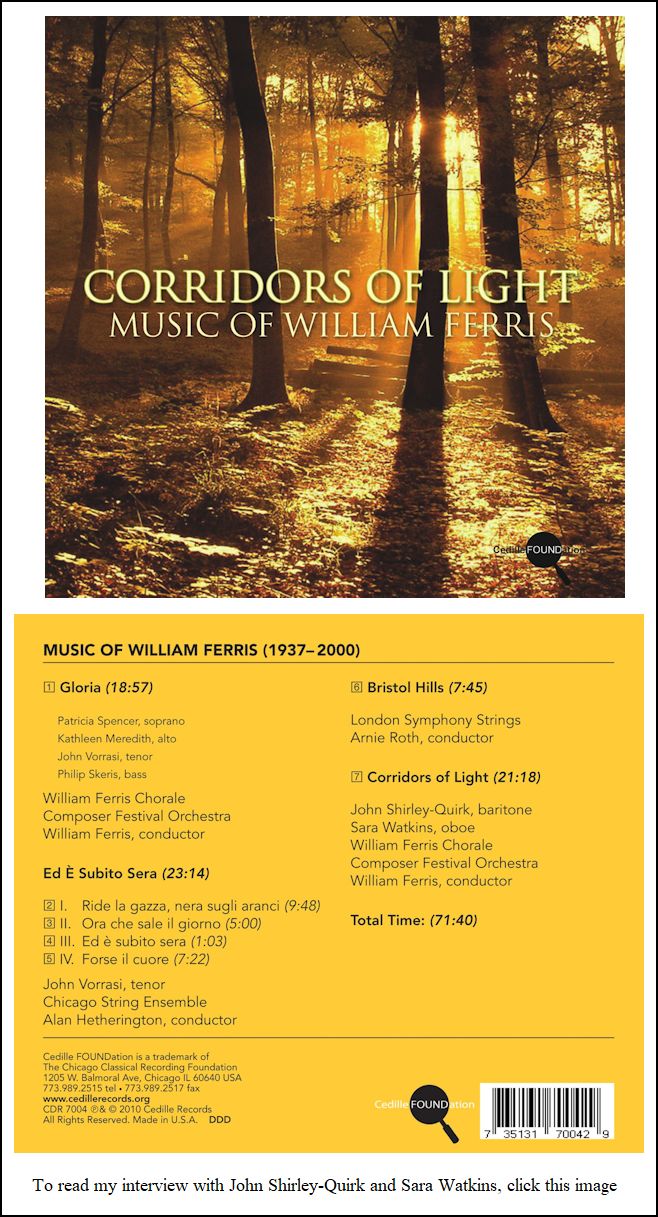
BD: Do you help in selecting the singers
for the Chorale?
Vorrasi: No.
BD: That’s Ferris’s decision
completely?
Vorrasi: Right. Sometimes he has his
associate conductor with him, but he does pick. I don’t sit in on
the auditions.
BD: What does one look for in a good Chorale
singer?
Vorrasi: You need a voice that can blend, and because
we do so much contemporary music, singers need to be rather adept at reading.
We put together very complex concerts of music in about thirty to
thirty-five hours of rehearsal, so they’re very intense, and they’re very
difficult. Bill certainly knows how to structure the rehearsals
so that they make a lot of sense. We can learn things that individually
you might throw up your hands, but the ensemble together, under his leadership,
manages to digest an awful lot of very complex music in a relatively short
time.
BD: What are some of the things about running
the Chorale organization that the public doesn’t know about?
Vorrasi: Almost everybody who’s in Arts Management
would say it’s the Drop-From-Heaven Syndrome. People just think everything
drops from Heaven. The programs drop from Heaven, the press releases
drop from Heaven, the labels or the seat markings just drop from Heaven,
the ushers just automatically appear... Somebody has to prepare
all this! There are a gazillion things that need to be done in the
background that everyone just takes for granted.
BD: And you have to do it all?
Vorrasi: [Blushing] Well...
BD: Or you have to make sure it all gets done?
Vorrasi: Right. Happily I do have some
support in this, but in the early days, I didn’t really have too much help.
But I shouldn’t really complain.
BD: One can always use a few more assistants.
Vorrasi: That’s right. “A
few more hands maketh the labor light.” [Both
laugh]
BD: I assume that you enjoy running the Chorale?
Vorrasi: I do, and I enjoy doing the music from the
other side of the footlights, too. It’s really fascinating.
I certainly enjoy being in touch with all the guest artists, and all the
things that are part of that. It’s really quite fascinating and
quite wonderful.
* * *
* *
BD: What advice do you have for audiences who
would come to a Chorale concert, either for the first time or for the
fiftieth time?
Vorrasi: Just come with open ears. One of
the aspects of the Ferris Chorale is that we’re always doing off-the-wall
things, but it is all certainly listenable music. Bob Marsh [long-time
music critic for the Chicago Sun-Times], once wrote, “Contemporary
music is supposed to scare audiences away, but it seems to have the opposite
effect with the Ferris Chorale audience, because it seems to be getting
larger all the time.” It’s really because the
audience has come to trust the fact that if we’re preparing it and doing
it, Bill obviously believes there’s something there that’s worth hearing
and knowing about. That’s a good attitude to have
— just always come to the Ferris Chorale concert
and you’re bound to get a good meal.
BD: It’s trust that you have built up over the
years?
Vorrasi: Yes, yes, indeed.
BD: Does it please you to know that a lot of the
music being written now at the end of the ’90s
is starting to come around to being more tuneful?
Vorrasi: That’s quite interesting, really. The
pendulum is indeed swinging back. We’re getting more conservative,
and I think that’s good. It’s just a pity we had to lose so many
years when we could have been building up all this music, rather than things
that didn’t really want to communicate.
BD: Is there a place for that music, or is it
consigned to the trash leap of history?
Vorrasi: [Thinks a moment] It’s consigned to
the dusty old tombs and universities, where most of it came from anyway.
BD: You have no part of it?
Vorrasi: I’m not moved by it, so it doesn’t
speak to me. I can’t find the music in it, really. I can
see the technique in some of it, which is quite brilliant, but it’s like
getting all dressed up for dinner and being served sand.
BD: What advice do you have for someone who
wants to write for the solo voice, or for the chorus?
Vorrasi: There are a lot of wonderful models they
can look to in both early and contemporary music. Certainly they
should think about melody as being not necessarily tunes, but lines that
actually fit the voice. In the Chorale, we certainly sing a lot of
music that’s somewhat jagged, and not quite as linear as polyphony from the
Renaissance. But there is a way to be able to sing contemporary
music that still maintains a line. I’ve done music which is not
as melodic in the traditional sense as, say, a Schubert song, but they’re
definitely melodies, and they definitely can be sung lyrically. You
aren’t barking like the dogs here trying to grab notes, or flying up and
down off the page. There’s a logic to the movement.
BD: [With mock horror] You mean music
is supposed to be logical???
Vorrasi: [Laughs] Well, of course, it’s
logical. When you talk to someone, your sentences have logic. If
it doesn’t have logic, they wouldn’t know what you’re talking about.
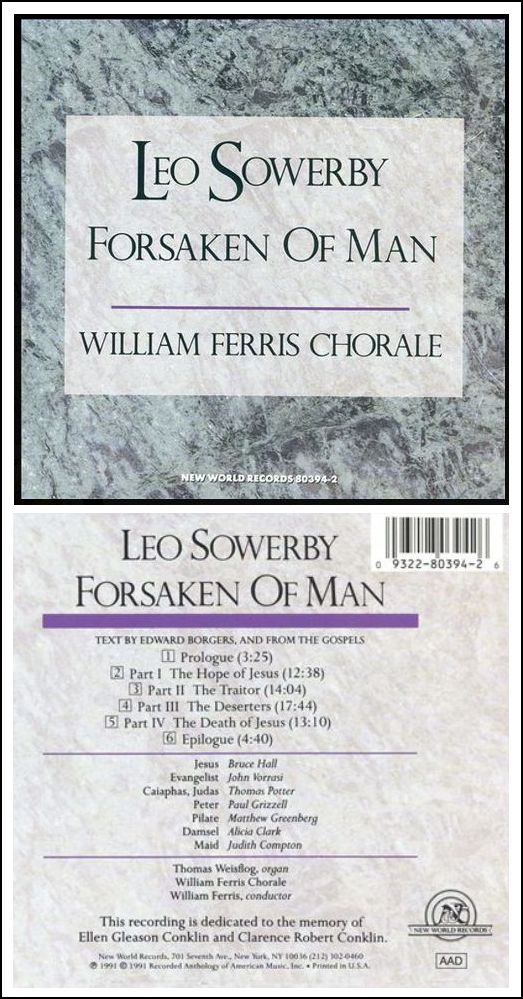
BD: Is music supposed to be pretty?
Vorrasi: [Hesitantly] Well, ‘pretty’
is a strange word. Music is supposed to be ‘beautiful’.
That’s a more difficult word, and it’s better than ‘pretty’.
BD: Then where is the balance then between the
logic and the beauty?
Vorrasi: Beauty has its own internal logic. Beauty
has an internal form. It’s very difficult
to say that merely if it has technique it’s going to be beautiful, because
that’s not true. A statue can be technically wonderful, but
not be beautiful. It can be correct, but it can be nothing.
A poem can be metered and have rhythm, but not necessarily be beautiful
unless there is some internal beauty to it. The internal form has
to be beautiful.
BD: Is this what you look for when selecting
pieces to do either for yourself or for the Chorale?
Vorrasi: I certainly look for the beauty of a piece,
and if it’s something for me, whether I feel that my
vocal abilities would suit the music, or if the music would suit my abilities.
There are certain things that I would like to do, but they’re either
too low, or the range breaks in certain ways that I don’t feel I’d be comfortable
with. Remember, we can’t afford to hire orchestras.
* * *
* *
BD: Do you like being a tenor? Would you
rather be a bass?
Vorrasi: Oh no, I love being a tenor. We
tenors are very rare birds.
BD: Has the phenomenon of The Three Tenors helped
or hindered you as a tenor?
Vorrasi: I must say that I absolutely love the
sound of Pavarotti’s voice, and I like very much the voices of Domingo and
Carreras as well. They’re wonderful singers. I’m not too keen
on The Three Tenor thing. I understand that’s a great way to make
money, and it’s a great crossover event, but it’s a little too much of
a carnival for me. I don’t need to hear Nessun Dorma where everybody
takes a line and then sings away. It just doesn’t make too much sense.
There’s not much real integrity in the music-making there. It’s
beautiful sounds, but it’s not much music.
BD: If you get in a taxi and the cabbie asks
what you do, and you say, “I’m a tenor,”
does he respond, “Like The Three Tenors?”
Vorrasi: Oh, yes. The best thing was when
I was visiting in Italy, and they asked what I did, and I said, “I’m
a tenor.” They replied, “Caruso!”
[Laughs] So, that was more fun.
BD: Is music fun?
Vorrasi: Oh yes, music is fun. It’s a cruel
mistress sometimes, but it is fun. I do love music. I don’t
know what I’d do without music. Ever since I was a kid I was singing.
When I was in second grade, the good nuns brought me down to the
seventh- and eighth-grade classrooms to sing Santa Lucia for them,
because here was a little kid that could actually sing in a foreign language.
My family, of course, would always sing, too. My aunt and my uncle
belonged to an operatic society in Rochester, and they took me to my first
operas. I was eight or nine years old when I went and heard Rigoletto
for the first time in Rochester. I was just unbelievably excited by
that. Images and music kept running around in my head. I went
back to their house and spent the night after that. My cousin had
a piano, and she had the music of La Donna è Mobile. She
was couple of years older than I was, so she was about ten or eleven, and
she played. It was just grand. It was wonderful. At family
gatherings we always sang. We were a very musical family.
BD: How do we get the audiences of the future
if they’re all at rock concerts and sporting events?
Vorrasi: That’s a real problem, because unless you
come from an ethnic background, people don’t sing in their homes anymore.
A lot of my friends have come from Western European or Eastern European
backgrounds, and they think nothing of bursting into song. I was
in a restaurant in Italy, and a bunch of Germans were there. Suddenly,
they all stood up and began singing at the top of their lungs. I
thought it was absolutely wonderful. It was insane. We wouldn’t do
it here... people would look at you like you were nuts. Even Happy
Birthday in a restaurant is considered extraordinary here, but they
just do it. Entertainment at home means everyone sings together. So,
it’s hard here. In the schools, music programs don’t feature vocal
singing. So it’s difficult, and I don’t know what the answer is.
BD: Is there a remedy?
Vorrasi: I don’t know what the remedy is. Certainly,
it’s not just listening to pop songs. I
listened to the Academy Awards songs, and they’re eminently forgettable.
The three songs they sang were awful. I’m hard pressed to even
call them songs.
BD: The vocal production by pop singers would
take the life out of an artist such as yourself.
Vorrasi: It’s all in the microphone. Bocelli
has a fabulous natural instrument, but I do believe that the sound is basically
produced for the microphones. There, it’s a wonderful sound.
BD: Today’s Broadway singers produce their sound
all in the throat, not in the diaphragm.
Vorrasi: That’s absolutely true, and, again,
it’s all put into the microphone. They wear the microphones on their
heads when they sing. It’s not like in Ethel
Merman’s day when she got up there on stage and sang.
BD: She belted it out.
Vorrasi: She did, yes. Also, the unfortunate
thing that I find very distracting is to go to the theater when everyone’s
on microphone, and to see the people in different parts of the stage, but
the sound is always coming from the same place. It doesn’t make any sense
to me.
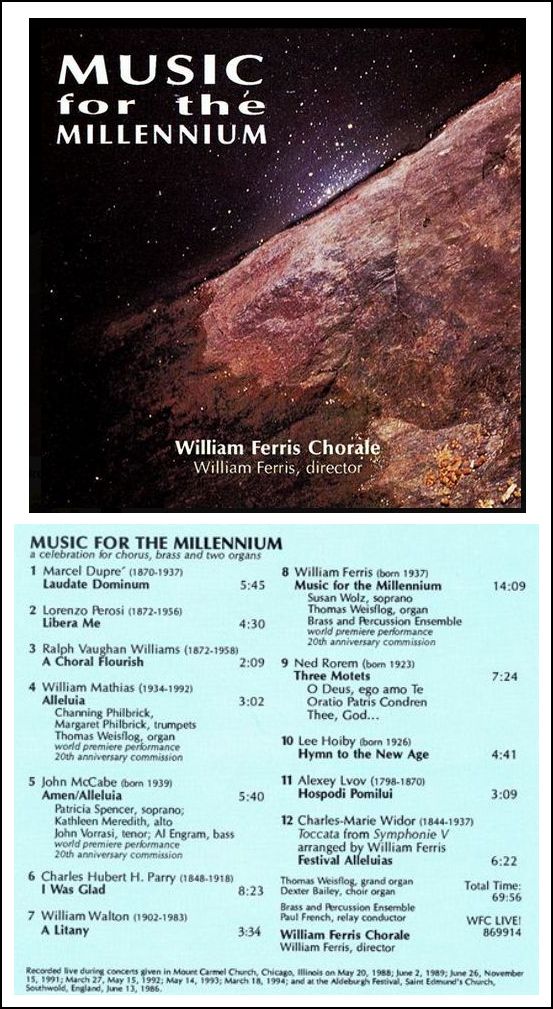
BD: Eventually they’ll have speakers across
the spectrum, and the sound designer will be able to ‘stage’
what you hear.
Vorrasi: That would make things better, but...
BD: ...then, it’s just more technical gizmos?
Vorrasi: Right. [Vis-à-vis
the recording shown at right, see my interviews with William Mathias, and John McCabe.]
* * *
* *
BD: Tell me a bit more about your experiences with Peter
Pears.
Vorrasi: We brought him to Chicago at the seventh
anniversary of Britten’s death, and we did a special program called Bravo
Britten. We had a masterclass and lecture at the Cultural Center.
Then, the Chorale did the program which included the American premiere
of a work of Britten that they found in a drawer after he died! We
also did Noye’s Fludde, but he was here for a whole week and it
was just a wonderful thing. He was a great man. He invited
us to sing at Aldeburgh... of course I thought he was just being polite,
but he wasn’t. He really wanted us to sing at Aldeburgh, so, about
four years later (1986) we went. I fought against it. I didn’t
want to go because I just was too nervous, but he said, “Just get on the
plane and go,” so I went. I went first to Cardiff in Wales because
we had to do a thing for the BBC there. Then I went to Aldeburgh
and I met with the manager of the Aldeburgh Festival. I went by the
North Sea where the festival office is, and there was a gale. It was
January, and actually I left Chicago on the day the Bears won the Super
Bowl. It was just impossible. It was madness. So we went,
and the North Sea had waves as huge as you can imagine. Then, I saw
the Moot Hall from Peter Grimes. Of course, I had known Peter
Pears as Peter Grimes, and we had all our meetings there. We went
into this wonderful pub for lunch, and I said, “Do you think I’ll see Peter?”
Well, Peter had come to the restaurant, and he had this big lunch party
set up to welcome me there. It was just great. Afterwards he
said, “Now you have to come for tea to the Red House.” So I went to
the house, and we had a wonderful time. We sat by the fireplace, and
I told him all my crazy prejudices in music —
what I didn’t like and what I did like, and he went, “Hmmmm...”
I probably enraged him, but we had a really swell time, and he said,
“We will see you in June.” We hugged, and I remember turning around
and waving good-bye, and then, a couple of months later he was gone.
BD: I’m glad you went there.
Vorrasi: Oh, man, yes, I am too. There
are just so many things that I’m blessed with because of my association
with Bill Ferris and the Chorale. We started it together in 1972.
I did the administration, and he did the artistic things. It’s
such a big part of my life.
BD: [With a gentle nudge] Were you also blessed
to do commercials?
Vorrasi: [Laughs] I love to admit that I have
done a bunch of commercials. It all started completely by accident,
and all the things I’ve done have been food commercials. First, it
was a McDonald’s commercial at Super Bowl time. They were doing something
that required a little trio or quartet of singers, and I went down and
sang, and it was accepted. It was a hit, so I was working with this
wonderful company called Intuition Music, who put together these things.
Then I got to do things for the National Cheese Council, and I did a commercial
for Wendy’s. But of course, my biggest commercial was for DiGiorno
Pasta. I sang a little tag at the end of the commercial [“For
restaurant taste at your place, DiGiorno!”]. It
must have run for a year-and-a-half. It ran nationally, and I made
an obscene amount of money for five seconds of music. It was quite
an eye-opening experience, but the amazing thing about it was that people
from all ends of the country were calling. First it was friends that
heard the commercial and asked if it was me. They said it sounds just
like me, so was it? Then, the advertising agency out in California
called, because someone wanted to know if I had made any recordings that
they could buy. All this from a five-second tag at the end of a commercial!
I thought to myself, it really is amazing the power of music. I’m
very pleased they liked my voice, and that they could sense there was something
they heard in five seconds. So, it was a very intelligent commercial,
obviously. [Both have a huge laugh]
BD: That’s the power of commercial advertising.
Vorrasi: Well, I guess that is true.
BD: Does that then translate back to your performances,
and to the audiences for the Ferris Chorale?
Vorrasi: The trouble with me is that I never take
things seriously. If I’m singing a five-second commercial, or if
I’m singing a role in a contemporary opera, or singing a very complex
contemporary song cycle, or even if I’m singing in the chorus, I treat
it all the same way. Ultimately, it really rips you apart, because
you’re giving of yourself all the time. But if you don’t give of
yourself, then what’s the point? The lyric art is the most delicate,
the most fragile, yet the most sturdy of all the arts. There’s a
wonderful Warlock song that says, “I’m me. How shall my heart be stilled,
or where else shall we find one like me, who must be killed for being too,
too kind?” But you’ve got to give everything, otherwise there’s
no point. You have to burn your candles at both ends. You
have to have technique or you lose it all, but ultimately you have to
give everything.
BD: Thank you for being such a giver.
You’re a very different kind of singer.
Vorrasi: That’s true. There are a lot
of people out there who are just interested in doing the standard repertoire,
but I’m not, and never have been. I’m always more interested in making
the music, and especially working with all these composers, and knowing them
as friends. It’s a joy to make music for them.
BD: Thank you for giving so much of your
time and talent to Chicago.
Vorrasi: Chicago has been wonderful to me,
especially working with William Ferris and the Chorale. That really
saw the flowering of my musical gift. I have had magnificent opportunities
to make wonderful music, and to meet with wonderful composers and artists,
and to really contribute something to the life of the city. Also,
I’m very happy about my work at Our Lady of Mount Carmel Church, because
I really feel that I’m doing an important thing there as well. So,
I’m very happy that I could do this here in Chicago,
© 1998 Bruce Duffie
This conversation was recorded at the studios of WNIB, Classical 97
in Chicago, on April 4, 1998. Portions were broadcast on WNIB the following
month. This transcription was made in 2021,
and posted on this website at that time.
To see a full list (with links) of interviews which have been transcribed
and posted on this website,
click here. To
read my thoughts on editing these interviews for print, as well as a
few other interesting observations, click here.
* * * *
*
Award -
winning broadcaster Bruce
Duffie was with WNIB, Classical
97 in Chicago from 1975 until
its final moment as a classical station in February
of 2001. His interviews have also appeared
in various magazines and journals since 1980, and he
now continues his broadcast series on WNUR-FM, as
well as on Contemporary
Classical Internet Radio.
You are invited to visit
his website for more information
about his work, including selected transcripts
of other interviews, plus a full list of his
guests. He would also like to call your attention
to the photos and information about his grandfather,
who was a pioneer in the automotive field more than a century ago.
You may also send him E-Mail with comments,
questions and suggestions.
